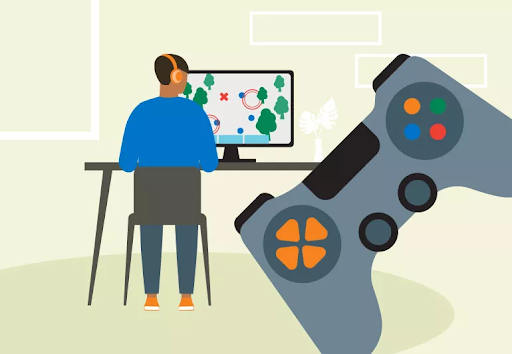The role of video games in the development of critical thinking and creativity in children and youth
Video games are seen not only as entertainment but have also become an important part of everyday life for children and youth, shaping their interests, skills, and social connections. Although their original purpose was quite different, they have shown great potential for improving certain skills, fostering critical thinking, and encouraging creativity. In recent years, studies have highlighted the ways in which engaging with games can develop problem-solving skills, encourage out-of-the-box thinking, and enhance cognitive abilities. In this article, we will explore how video games can be used as a tool for nurturing critical thinking and creativity, guiding children and youth toward skills that are valuable in education, work, and everyday life.
 Developing Problem-Solving Skills Through Gaming
Developing Problem-Solving Skills Through Gaming
As mentioned in the previous paragraph, games today are not only used for entertainment. Many of them require players to solve complex tasks, make strategic decisions, and engage in critical thinking under pressure. In these games, players often need to overcome obstacles using logic and strategy, which also helps to develop key problem-solving skills. Puzzle-based games, as well as platforms like
dota 2 betting, often feature scenarios that force players to think several steps ahead, predicting opponents' moves or figuring out how to navigate challenges effectively. Additionally, multiplayer games and esports disciplines demand not only professional skills and abilities but also teamwork, pushing players to assess situations, assign roles, and adapt strategies. This dynamic creates an environment where critical thinking is not only encouraged but necessary for success.
The best examples are popular games like Dota 2 and CS2. They introduce young gamers to strategic environments that require quick decision-making, resource management, and rapid reaction skills. Because of this, many gamers need to practice diligently and turn to resources like dota 2 betting sites, as these platforms not only provide a competitive edge but also reflect the strategic depth and statistics necessary for success in such games.
Video Games and the Enhancement of Creative Thinking
Creativity is another area where video games are at the forefront and can play a crucial role in the development of children and youth. With a wide range of genres and games to suit any taste, everyone can find something that interests them. Games that encourage creativity the most are open-world exploration and sandbox games, which provide opportunities to discover new things, create, build, and develop skills for creative problem-solving, storytelling, and self-expression.
Popular titles like Minecraft and Subnautica allow players to explore vast worlds, experiment, and build. In these games, young players can effectively use their imagination to construct, explore, and experiment. These experiences mirror traditional forms of creative play, where the only limits are set by the player's imagination.
Story-driven games also promote creativity, engaging players in complex narratives that require them to make choices affecting the game's outcome. These narrative choices can foster empathy, an understanding of different perspectives, and the ability to navigate moral dilemmas, which are key aspects of creative thinking, much like a dota betting site challenges players to think strategically.
Social and Educational Benefits of Video Games
In addition to critical thinking and creativity, video games offer a range of social and educational benefits. Multiplayer and cooperative games encourage communication, teamwork, and collaboration among all players, developing social and communication skills that are valuable both in gaming and professional environments.
Furthermore, many educational games are designed to teach specific subjects, such as history or mathematics, in an engaging and interactive way. This is called gamification, and this teaching method has already been adopted by many schools and universities. It involves integrating games and programs into the curriculum, allowing students to better absorb educational material. These games can make learning more accessible and enjoyable, increasing a child's motivation to gain new knowledge.
Gamified educational platforms, which are becoming increasingly popular in schools, combine traditional learning with game mechanics. This combination can lead to better information retention, making abstract concepts more concrete and easier to understand.
How to Choose the Right Games for Development

Parents, educators, and even young gamers themselves should consider which types of games are most beneficial for developing useful skills. To do this, it's important to know the criteria to look for. The first thing to pay attention to is age restrictions. If a game is meant for adults, it is often not suitable for children. The next criterion is the game genre—strategy, puzzle, narrative, or multiplayer games are the best for developing useful skills. Another important factor is the set of features the game offers. If you search for games based on these criteria, you are likely to find something suitable.
It’s also worth mentioning that parents can seek advice from reliable sources or consult reviews and visit specialized sites, similar to bet on Dota 2, which publish information not only about esports but about games in general. The right games can serve as a bridge between entertainment and education, helping children and youth sharpen their critical and creative skills while having fun. With a balanced gaming experience, children can develop the skills necessary for problem-solving in school, social interactions, and beyond.
Conclusion
Bringing all the facts together confirms the thesis that video games have significant potential for fostering critical thinking and creativity in children and youth. Through strategic gameplay, problem-solving scenarios, and opportunities for creativity, video games can develop valuable skills relevant both inside and outside the classroom. Although concerns about excessive gaming time remain relevant, a balanced approach—including guidance from parents and teachers—can lead to a positive gaming experience. By understanding the benefits and choosing the right types of games, children and youth can enjoy engaging and educational leisure that helps them develop essential skills for the future.
As this field continues to evolve, its role in education and cognitive development is likely to grow, emphasizing the importance of viewing games not only as entertainment but also as tools for learning and personal growth.

